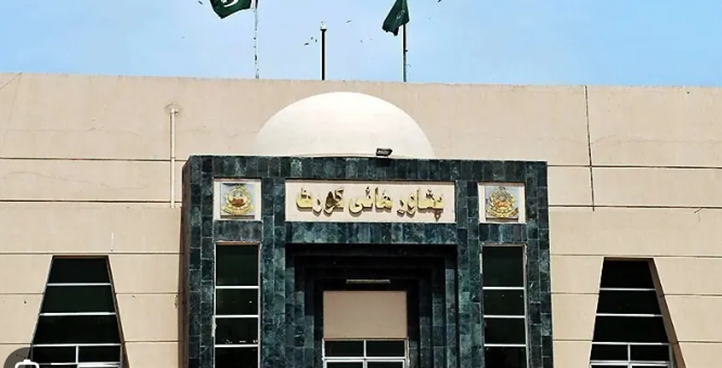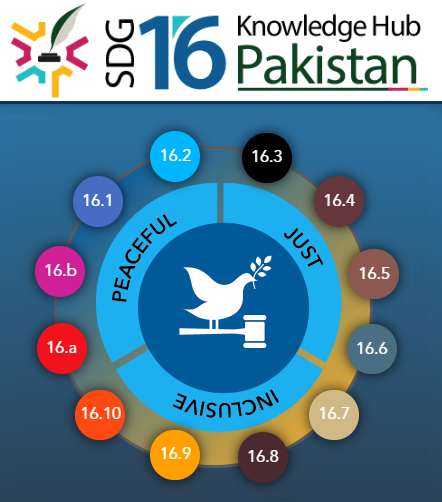

International Day for Judicial Well-being: A Global Call for Action (4 Mar, 2025)
Pakistan Ranks 129 out of 142 in the World Justice Project Rule of Law Index (26 Oct, 2024)
2024 Trafficking in Persons Report: Pakistan (24 June, 2024)
Pakistan ranks second-last in WEF Global Gender Gap Report 2024 (7 Mar, 2025)
PHC larger bench to deliberate on reforming criminal justice system

Wed, October 15, 2025
Peshawar High Court has sought detailed reports from different stakeholders and constituted a larger bench for hearing the pleas highlighting flaws in criminal justice system and seeking reforms in it.
A bench consisting of PHC Chief Justice SM Attique Shah and Justice Mohammad Ijaz Khan directed KP inspector general of prisons to submit a detailed report regarding the total number of under-trial prisoners presently languishing in jails throughout the province.
The bench formulated several questions for stakeholders, seeking their replies within a fortnight.
The bench also included as necessary parties in the petitions different stakeholders including secretaries of the ministries of interior, law and justice and human rights, Law and Justice Commission of Pakistan, the director general of KP Judicial Academy, additional IGP of counter-terrorism department (CTD) and provincial health secretary.
Formulates queries for determination, seeks details of under-trial prisoners
The bench was hearing two public interest petitions filed by a citizen Asifullah and a senior lawyer Shabbir Hussain Gigyani, respectively.
In its 20-page detailed order, the bench announced constituting a larger bench comprising PHC Chief Justice SM Attique Shah, Justice Syed Arshad Ali, Justice Sahibzada Asadullah, Justice Mohammad Ijaz Khan and Justice Salahud Din, which would hear the petitions in the second week of Oct.
Barrister Amirullah Khan Chamkani appeared for petitioner Asifullah and stated that CJS in KP had almost collapsed due to structural and procedural failures.
He said that those deficiencies collectively resulted in systematic violations of fundamental rights, particularly the right to fair trial guaranteed under Article 10A of the Constitution.
He said that people across the province were losing their precious lives, honour, dignity, respect and both moveable and immoveable properties, yet they were not receiving proper justice owing to grave shortcomings in the justice sector, including false implications, exaggerated charges, weak investigations, poor oversight by district public prosecutors, defective trials and flawed sentencing.
Similarly, petitioner Shabbir Gigyani has sought directives of the court for the respondents to ensure early submission of Challan (charge sheet) in terms of Section 173 of Code of Criminal Procedure (CrPC) and rules 6 and 7 of National Judicial Policy, 2009, as non-compliance thereof amounts to violation of articles 4, 9, and l0-A of the Constitution.
Several lawyers well-versed in criminal jurisprudence including Mohammad Nisar Khan, Mohammad Sareer Khan, Sahibzada Riazatul Haq, Syed Akber Ali Shah and Tafseel Khan Afridi appeared on court notice and put forward their opinions.
Apart from the advocate general, Shah Faisal Uthmankhel, and the additional advocate general, Inam Khan Yousafzai, the director general prosecution, Robin Haider Bukhari, also turned up in the case.
“As the constitutional court of the province, it is incumbent upon this court to take due notice of any violation of fundamental rights and any deviation or negligence in the application of laws relating to criminal justice system,” the bench observed.
It formulated around 20 questions for determination by the court in the light of assistance to be rendered by lawyers representing petitioners and respondents, law officers, director general prosecution and all other stakeholders.
Some of the questions are: Whether refusal of police to register an FIR in cognisable cases and its subsequent registration through an application under Section 22-A CrPC (justice of peace), renders police liable lo penal and compensatory consequences?
Whether a false, frivolous, or exaggerated FIR or complaint entails penal and compensatory liability for the complainant, as well as for the police officers, who facilitate such proceedings? Whether defective investigation, inadequate prosecutorial oversight, and delays or improper application of law and procedure by criminal courts are contributing factors to the low conviction rate in the country, particularly in the province of KP?
Whether the investigation branch of police is fully independent of the operational branch so as to effectively and independently perform its statutory duties? Whether the existing substantive and procedural criminal laws in force in KP are sufficient to meet the needs of modern times, particularly with reference to strengthening of CJS or whether they stand in need of revision?
Whether there exists any proper and effective oversight mechanism to hold various stakeholders of CJS, such as judiciary, police, prosecution, investigating officers, medico-legal officers, and jail authorities, accountable for non-compliance with their statutory duties and other mandatory provisions?
Whether independent forensic laboratory exists in KP, and if not, whether any measures have been taken to establish the same or otherwise? Whether prosecution is fulfilling its statutory duties as envisaged under KP Prosecution Service (Constitution, Functions and Powers) Act, 2005, including but not limited to the duty of prosecutorial supervision?
Whether the failure of prosecution to submit Challans within the statutory period of 14 days, as mandated under Section 173 CrPC, amounts to a violation of fundamental rights of under-trial prisoners guaranteed under articles 4, 9, and 10-A of the Constitution, and whether such failure entails penal or compensatory consequences? Whether criminal trials are being concluded within the statutory period or not; and whether the law provides any remedial measures in cases where trials are not concluded within the specified period?
The bench also directed the DG prosecution to submit details about current pendency of cases before the prosecution department; number of district public prosecutors (DPPs) against whom departmental action was taken for poor oversight and low conviction rate; the number of cases in which DPPs had recommended action against investigating officers to relevant district police officers and their outcome; etc.
Similarly, the bench also put multiple questions to KP Forensic Science Agency, provincial health secretary and DIG investigation, directing them to submit their respective reports in the light of the said questions.
Copyright © 2026 pjn.org.pk








